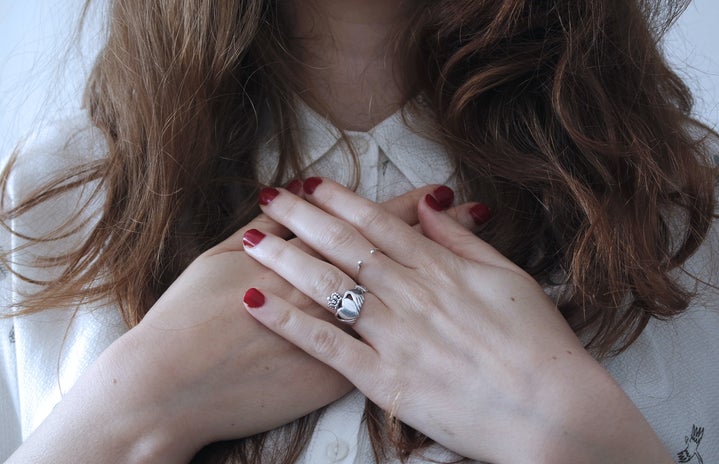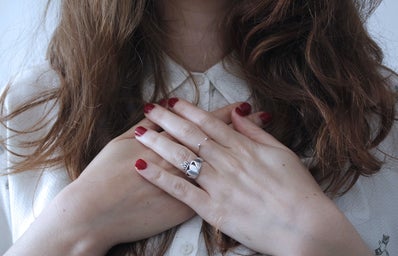Derry Girls is a sitcom set in Northern Ireland during the 90s that follows the lives of Erin Quinn, her cousin Orla McCool, their friends Clare Devlin and Michelle Mallon, and Michelle’s newly-arrived English cousin, James Maguire. These teens must navigate through school, crushes, and familial troubles, all amidst a tense and turbulent period of time in Ireland’s history.
The diverse situations that these characters go through, while highly entertaining, also speak to a deeper understanding of the different experiences of growing up. Derry Girls touches upon a variety of themes like loss, love, politics, and the inevitability of change in a relatable and enjoyable way. While I watched the series I cried, laughed, and reflected on my own life. I found Derry Girls to be deeply moving and important so I will share with you some of my favorite things about the show:
Humor
Whilst Derry Girls is a sitcom, it handles a lot of heavy themes. These are often addressed with humor, which makes them seem less serious and easier to grasp, but no less important. The comedic aspect of the show is used as a tool not just to entertain, but to relate to the audience in a more profound way. In everyday life, where problems and conflicts abound, a good laugh is always a welcome respite. This can be seen very clearly when James is about to leave Derry to live with his mother in England, and he is assured by Michelle, in her most earnest and sincere way, that he is a Derry Girl like the rest of them because it is just a state of mind. This is the sort of dynamic of the show. It is also noteworthy that, while it is humor that can make light of a tough situation, it never offends or detracts from the deeper message.
Granda Joe
Joe McCool is a character interpreted by Ian McElhinney. In the series, Joe is Erinn and Orla’s grandfather. He is portrayed as a man that is deeply devoted to his family and, while this may not include his son-in-law, Gerry Quinn, it certainly includes his daughters, Mary Quinn and Sarah McCool, and his granddaughters. His devotion and love towards his family is something that is demonstrated in many of Joe’s mannerisms and actions, but mainly in the development of his familial relationships. While I had Derry Girls on my watch list for a very long time, I never actually got around to watching it until I saw a clip about Joe and Orla’s relationship. There is an episode about a school dance where the girls have to ask a boy of their choosing to accompany them, and while many would think about a possible crush or a friend, Orla chose to ask her grandfather. When asked about her date, she said: “Well, everyone kept saying you have to ask a fella you really like and he’s the fella I like the most.” This scene made me especially emotional because while I myself loved my grandfather, I hadn’t thought about him as strongly in a long time. In the same vein, my own grandfather was very dedicated to his family and his grandchildren. He was a very loving and kind man, and watching Orla with her grandfather made me reminisce very strongly about mine, and wonder if maybe I would have been able to share a dance with him at a school dance, family event, or maybe at my own wedding. I have missed my grandfather and thought about him since I was nine years old, and Derry Girls made me remember the love and care I felt for him.
Political Backdrop
Throughout the series, there is an underlying sense of tension, worry, and apprehension due to the political conflicts that had been concurrent throughout the majority of the 20th century in Northern Ireland. These issues, denominated as The Troubles, consisted of the growing divide between the Catholics and the Protestants. While the issue contained a religious aspect, it cannot be solely attributed to that; this was a conflict based on cultural and political differences. This was an issue for control. By this point, Northern Ireland was solely controlled by the United Kingdom and, whilst this may have been fine for some, others opposed British rule and promoted movements to leave the UK and join the Republic of Ireland. Due to the political movements during the second half of the 20th century, it was illegal to fly the Irish flag and the Irish Republican Party, Sinn Féin, was banned as well. During this time, neither Irish history or Gaelic were taught in schools. This conflict turned violent for both parties. As was shown in the series, Derry lived under constant military surveillance and threats of danger from opposing parties. In the first episode, it is shown that there is a bomb threat on a bridge which the girls must cross to get to school. The gravity and consequences of the issues are shown more heavily during the series finale due to there being talks about releasing some of those involved in the violent squirmishes from prison. One of those being released could be Michelle’s brother, who at that point had been imprisoned prior to the beginning of the series. This discourse leads to a confrontation between Erin, who believes he shouldn’t be released, and Michelle, who wishes her brother could come home. This leads to a larger conversation about what becomes of those who fight for their ideals, how far they would go, and who determines which group or individuals are fighting for the right thing.
Before watching Derry Girls, I wasn’t really aware of the struggles that Northern Ireland or the Republic of Ireland had gone through. Whilst watching, I became more aware of the conflicts that they have faced through the years and was able to draw parallels to the history of my own country. Puerto Rico has been in a political limbo for years, where conflicting ideals have persisted on the island; some wish for total independence, others want to be annexed as a U.S. state, and some believe it is best to remain as we are. This speaks nothing of the struggles of the 20th century where the Puerto Rican flag was illegal, Spanish wasn’t taught in schools, and the Nationalist Party was outlawed and its members were persecuted as criminals. There was also the military occupation of Vieques and subsequent bombing by the U.S. Army. Today we still face many consequences because of these issues, which are shown in the highly unstable electrical power system of the island, our broken economy, and the gentrification of our country. As with Erinn during the last episode where the characters were meant to vote in order to choose about the future of their country, I recognize the need for us to do the same.
Erinn’s Final Words
While Erin says her last words of the series, the song “Dreams” by The Cranberries plays in the background and images of Northern Ireland’s history are shown.
“There’s a part of me that wishes everything could just stay the same. That we could all just stay like this forever. There’s a part of me that doesn’t really want to grow up. I’m not sure I’m ready for it. I’m not sure I’m ready for the world. But things can’t stay the same, and they shouldn’t. No matter how scary it is, we have to move on, and we have to grow up, because things… Well, they might just change for the better. So we have to be brave. And if our dreams get broken along the way… We have to make new ones from the pieces.”
-Erin Quinn
These last few lines encompass the show beautifully. It is about growing up, facing adversity, and being courageous in the face of change. I think these are feelings we must all come to terms with. Change is always scary, facing a new challenge can be scary, but we must be brave. We could fail and have to start anew or maybe we could succeed. Becoming an “adult” in itself is scary. Adulthood is a whole new world filled with an infinite number of new challenges. These can range from doing taxes, to starting and then graduating from university, to even going to doctor’s appointments by yourself. The point isn’t that you shouldn’t be afraid, but that all of us are really afraid and that we should just have the courage to accept change.I think Derry Girls will forever hold a special place in my heart. It came to me at a difficult time and I will admit that watching the series was a cathartic experience. It helped me not just brave adulthood but to accept it. That growing up and changing isn’t a bad part of life but a necessary one. I like who I am now, but I also like who I was before, and I hope I will like who I become.


